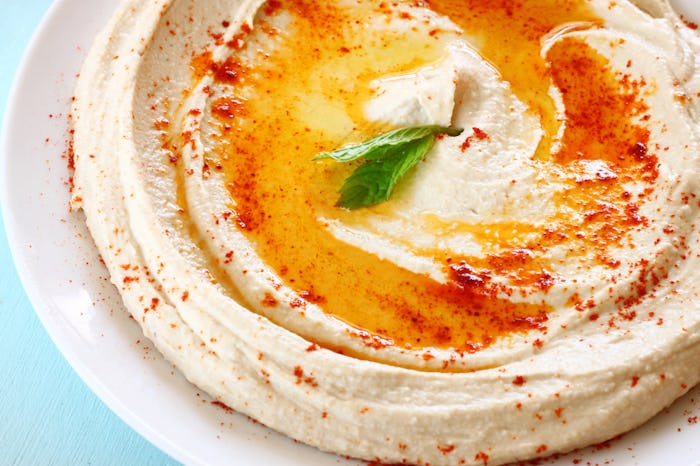Life

Here's When Your Baby Can Start Smearing Hummus All Over Their Face & High Chair
Once your baby is old enough to start eating solid foods, it's so much fun to experiment with different tastes and textures. I absolutely loved making baby food for my sons, and was always Googling to find out when they could try certain types of foods. Because hummus is a go-to snack for me already, it made sense to let my kids try it as babies. But was that really a good idea? Experts say that the answer to the question "When can babies eat hummus?" is pretty straightforward.
"At 6 months of age, right around the time you begin to introduce solid foods, babies can be introduced to hummus," Meredith Dillon, RD, LDN, CDE, an outpatient dietitian and diabetes expert at Children’s National Health System, tells Romper.
According to the American Academy of Pediatrics, parents can introduce babies to solid foods around 6 months of age, and should include a variety of healthy food with different textures. From a nutritional and texture standpoint, hummus fits in perfectly. "Hummus is a great way to get protein that beans and legumes provide (as it is made from chickpeas) without offering whole beans that are a potential choking hazard," says Dillon. "Hummus also provides a good source of polyunsaturated fats that are needed for brain development in children before their first year of life. Additionally, iron is a particularly vital mineral for babies aged 7 to 12 months, and chickpeas are a great vegetarian source of iron."
Topfoodfacts.com described hummus as "a Levantine Arab dip or spread that is made from chickpeas (also known as garbanzo beans) that have been cooked and mashed, then blended with tahini (a paste made from sesame seeds), olive oil, lemon juice, garlic, and salt." While there is no real answer as to the official origin of hummus as we know it today, many countries in the Middle East try to lay claim to creating this tasty dish, according to a BBC Travel story by Diana Spechler. The article also noted that the origin of the chickpea itself dates all the way back to 10,000 years ago in Turkey.
Hummus can be deliciously flavored with a myriad of herbs and spices, making it a great choice for parents wanting to introduce their babies to different flavors at a young age. The mushy, creamy texture of hummus works well for babies who may not have enough teeth yet to chew.
Babies can also lick hummus off of vegetables and breads that they can gum with their budding teeth. Angie Weiss, Nutrition Services Director at the Witchita Falls Food Bank in Texas, explains that parents can use hummus to encourage babies to try new vegetables. "Let them dip their vegetables in hummus. Dipping is fun for them and hummus is very healthy," she tells Romper.
Because it is often made with spices and contains potential allergens, experts recommend proceeding with caution when incorporating hummus into a baby's diet. "Hummus contains sesame seeds, which is one of the major allergens. Though it is a good idea to expose children to major allergens before their first year of life, you should consult an allergist before offering hummus if your child is at risk for food allergies. Additionally, making homemade hummus may be helpful when offering it to young children as store-bought hummus often has added spices like garlic and salt that may not be appealing to babies," says Dillon.
Personal taste preferences can vary widely. Just because you love hummus doesn't mean your baby will necessarily be as obsessed. Like with any new food, Dillon recommends a slow introduction. "When introducing new foods into a baby’s diet, be careful to introduce them one at a time so that you can recognize any adverse reactions a specific food may cause," she says. Your baby may not be into hummus right now, but continuing to offer the spread with meals and snacks might encourage your baby to try it again later on and develop a taste for it as they grow.